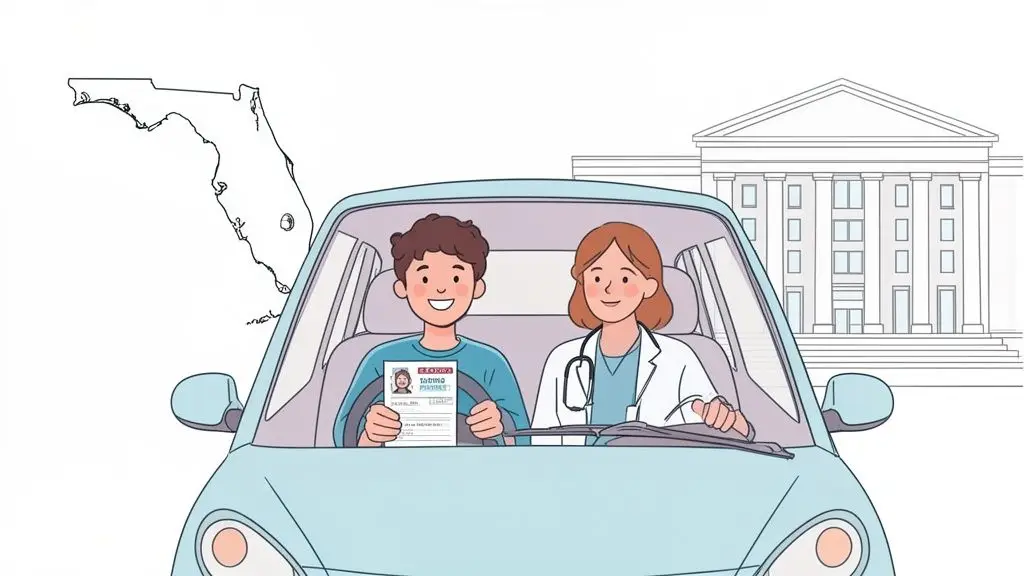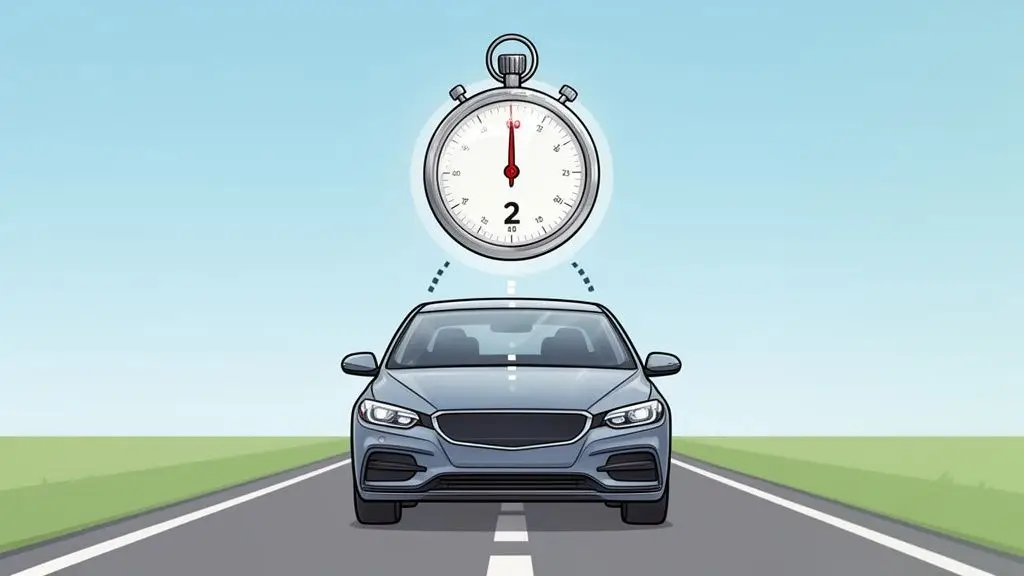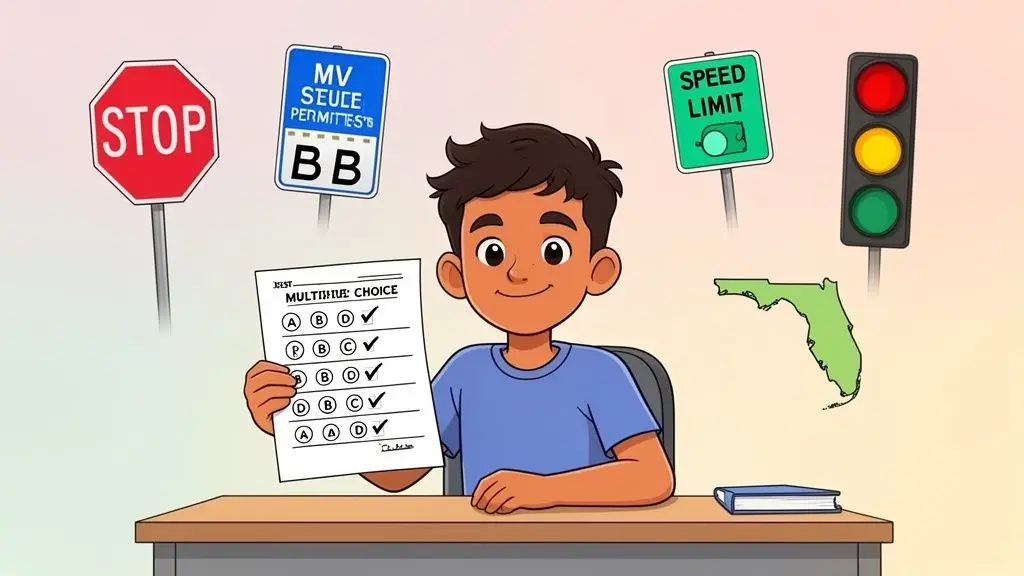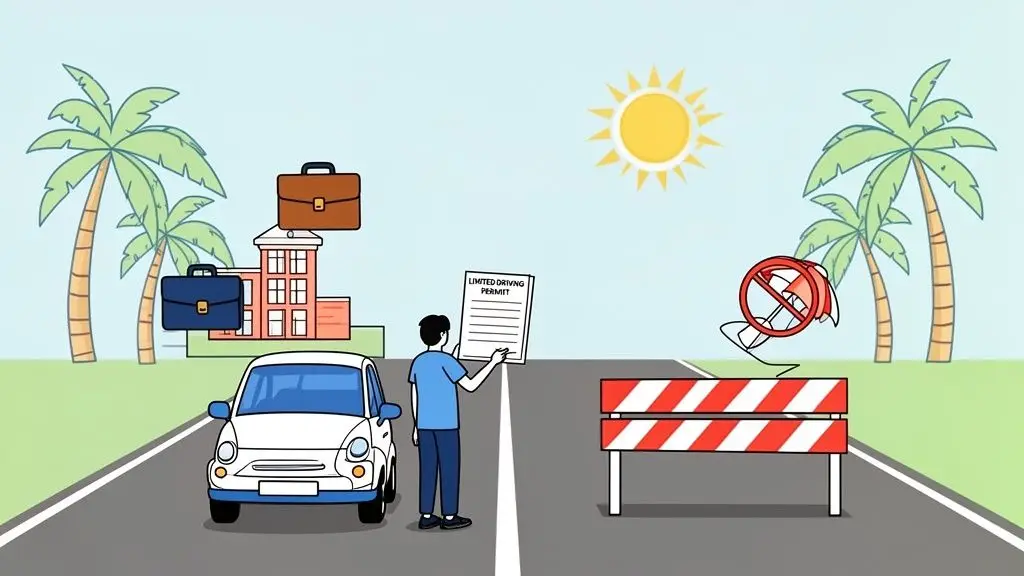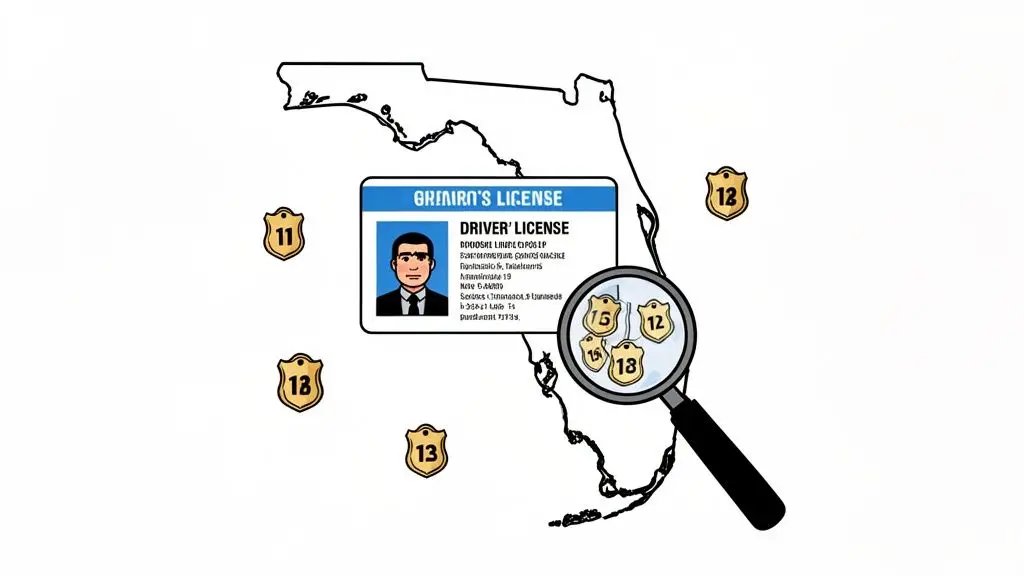To pass the Florida driving test and earn your ticket to freedom, it all starts with one crucial step:
completing the state-required driver education course. The specific course you need, either a
4-hour or
6-hour online program, depends on your age and drills you on the essential rules of the road. With that course certificate in hand, you can then tackle the written exam and schedule your behind-the-wheel test. This guide will walk you through the process, including key information about the
best online traffic school florida options available to you, like our
4 hour driving course florida online.
Your Roadmap to a Florida Driver’s License
Getting your Florida driver’s license feels like unlocking a new level of independence. But to get there, you need a clear plan. This guide is designed to break down exactly what it takes to pass your driving test, turning confusion into confidence. We’ll walk through the courses you need, the documents you must have, and what to expect on the big day. The journey starts with figuring out which pre-licensing course you need to take. Florida’s requirements change based on your age, and picking the right one is mandatory before you can even think about getting a learner’s permit. Our goal is to simplify this. We offer the premier tools to solve your driver education needs in a fast and easy way. With the best and fast
traffic schools in florida, you can meet state requirements and get your certificate instantly.
Choosing the Right First-Time Driver Course
Before you get anywhere near the driving test, you have to complete a state-approved education course. This isn’t optional; it’s a hard rule from the Florida Department of Highway Safety and Motor Vehicles (FLHSMV). The two main courses for new drivers are the TLSAE and the DETS.
- Traffic Law and Substance Abuse Education (TLSAE): This is the classic 4-hour driving course Florida online. It’s the standard requirement for all new drivers aged 18 and older who are applying for their first license.
- Driver Education Traffic Safety (DETS): This is a more comprehensive 6-hour driver education program. Recent changes now make this course mandatory for all teens between the ages of 15 and 17 applying for a learner’s permit.
The DETS course was specifically designed to give younger drivers a stronger foundation in risk management and safe driving habits. You can enroll in the official online DETS course at
FLORIDADETSCOURSE.COM to satisfy this requirement. A major benefit for Florida drivers who take this course is the enhanced safety knowledge it provides, which can lead to a lifetime of safer driving and fewer accidents. Before you schedule anything, use this quick checklist to make sure you have everything in order.

Florida Driving Test Requirements at a Glance
| Requirement | What You Need to Do | Who It’s For |
|---|
| DETS Course | Enroll in and pass the 6-hour Driver Education Traffic Safety course. | Teens aged 15-17. |
| TLSAE Course | Enroll in and pass the 4-hour Traffic Law and Substance Abuse Education course. | New drivers aged 18+. |
| Pass Written Exam | Study the Florida Driver’s Handbook and pass the knowledge test. | All new drivers. |
Having these items checked off is your green light to move forward with scheduling your driving test.
Beyond the First License: Your Ongoing Driver Education
Getting your license doesn’t mean your education is over. In fact, Florida law gives drivers a chance to keep their skills sharp and their record clean. For example, if you get a traffic ticket, you can often take a
basic driver improvement course, also known as a
bdi course.
According to Florida Statute 318.14(9), drivers who receive a non-criminal moving violation can choose to attend a driver improvement school. This law is a benefit to Florida drivers because it allows them to avoid points. Finishing a course like our Florida approved defensive driving course online means you can avoid points on your license—a huge win for keeping your insurance rates down. You can dig into the specifics of this law on the official Florida Statutes website.
Our
BDI course Florida is designed to be a fast, painless solution. We offer a variety of
driver education courses to help you out, whether you’re a brand-new driver or a veteran trying to handle a citation. For instance, got a speeding ticket? Our
traffic school for speeding ticket online is the perfect fix. It’s one of the easiest ways to deal with the ticket without stepping foot in a courtroom. From the
bdi driving course to other specialized programs, you can see all your options and get your certificate right after you finish.
Navigating Florida’s First-Time Driver Education Requirements
Before you can even think about getting behind the wheel for your driving test, Florida has a non-negotiable first step: completing a state-mandated driver education course. Which one you need to take comes down to a single factor—your age. Getting this right from the start is crucial, as it’s your official ticket to even apply for a learner’s permit. If you’re
18 or older and getting your first license, your path starts with the
4-hour Traffic Law and Substance Abuse Education (TLSAE) course. Think of it as the foundational program. It covers the essential rules of the road and the serious risks of driving under the influence. It’s the go-to for most adult first-time drivers in Florida. For these drivers, completing the TLSAE course is a huge benefit because it quickly satisfies state requirements, allowing them to proceed to the permit test without delay. For teens, however, the state has raised the bar to build a stronger generation of safe drivers.
The New Standard for Teen Drivers
Florida has been getting serious about teen driver safety, and that means providing more comprehensive training right from the beginning. To better equip young drivers for the real-world challenges they’ll face, the state has updated its requirements. The
6-hour Driver Education Traffic Safety (DETS) course is now mandatory for all aspiring drivers between
15 and 17 years old. In the past, teens could take the same 4-hour TLSAE course as adults. Now, they must complete this much more thorough driver’s education program. This new course is designed to instill a deep understanding of road rules, safe driving habits, risk management, and how to make smart decisions under pressure.
Comparing Florida Driver Education Courses: DETS vs. TLSAE
So, what’s really the difference between the 4-hour TLSAE and the new 6-hour DETS? It’s all about depth and who it’s for. The DETS course was created specifically for teens, adding two extra hours of training that dive deep into advanced safety topics, hazard recognition, and critical thinking skills. The benefit to young Florida drivers is a much stronger foundation in safety before they ever get on the road. The TLSAE remains the standard for adults, focusing on core laws and substance abuse awareness. Here’s a clear breakdown to help you see which course is for you.
| Feature | TLSAE Course (Ages 18+) | DETS Course (Ages 15-17) |
|---|
| Course Length | 4 hours | 6 hours |
| Primary Focus | Core traffic laws, substance abuse awareness | Comprehensive safe driving, hazard perception, risk management |
| Who It’s For | First-time adult drivers | First-time teen drivers |
| When to Take | Before applying for a learner’s permit or license | Before applying for a learner’s permit |
| Where to Take | Online TLSAE Course | Online DETS Course |
Ultimately, completing the correct course is your first official step. Without that certificate of completion—whether from the DETS or TLSAE course—you won’t be allowed to sit for the written knowledge exam, more commonly known as the permit test. To get a head start, you can find out exactly what to expect on the
Florida permit test. This chart really puts it into perspective. While both the written and driving tests require an
80% to pass, you have far less room for error on the practical road test, where just a few mistakes can mean failing.
How Our Courses Help You Beyond Just Getting a License
We’re here to make your driver education journey fast and easy. While the DETS and TLSAE courses are your gateway to getting a license, our other programs are designed to support you long after you’ve become a licensed driver. For instance, if you get a traffic ticket, our
basic driver improvement course (bdi course) can be a real game-changer.
Florida Statute 322.291 actually encourages drivers to take these courses by allowing them to attend a
driver improvement school online to keep their records clean. By completing a course at one of the
florida approved traffic schools, you can prevent points from ever hitting your license. You can read the full statute for yourself on the official
Florida Statutes website.
Practical Example: Let’s say you get a ticket for going 10 mph over the speed limit. This could add 3 points to your license. By choosing to complete a basic driver traffic school florida course, you can avoid those points. The benefit to you is that your insurance rates likely won’t increase, saving you money in the long run.
We pride ourselves on offering the
best online traffic school florida experience, with a full suite of
driver education courses ready when you need them. Whether it’s the required
basic driver course florida or a specialized
driver safety course, our platform makes it incredibly simple. You get your certificate of completion instantly, so you can resolve the issue and get back on the road without any hassle. This is why we have the
lowest price on florida traffic school.
How to Master the Florida Written Knowledge Exam
Before you can even think about getting behind the wheel for your road test, you’ve got to tackle the Florida written knowledge exam. It’s a step many people underestimate, but with a solid game plan, you can walk in feeling confident and pass on your first try. Think of this test as your first real opportunity to prove you understand the rules that keep everyone safe on the road. The exam goes deep into road signs, traffic laws, and tricky right-of-way scenarios. It isn’t just about memorizing facts; it’s about grasping the
why behind the rules. This is where a high-quality
driver safety course can be a game-changer, as it translates the dense handbook language into practical, easy-to-digest lessons.
What the Written Exam Covers
The Florida written knowledge exam is a comprehensive check of your road safety smarts. It’s not just a simple quiz—it’s a crucial part of learning
how to pass driving test florida. Every single question is drawn directly from the official state handbook, which should be your new best friend. You absolutely need to be sharp on a few key areas:
- Road Signs: It’s not enough to just recognize a stop sign. You’ll need to know signs by their shape, color, and symbols, and understand what they command you to do.
- Traffic Laws: This covers everything from speed limits in different zones to the proper way to change lanes and navigate intersections.
- Right-of-Way: Knowing who gets to go first at a four-way stop or when merging onto a busy highway is a huge part of the test.
- Parking Rules: The exam will quiz you on the specifics of legal parking, including no-parking zones and curb colors.
The best way to get comfortable with all this is to live in the official state guide. For a digital version you can access anytime, check out the
Florida Driver’s Handbook and get a head start.
Why So Many People Fail the First Time
You might assume the written test is the easy part, but the pass/fail rates might surprise you. A few years back, Florida made the exam significantly tougher to enhance road safety, bumping it from
20 questions to
50. The result? A surprisingly low pass rate. In fact, data has shown that nearly three out of every five applicants fail on their first go.
To pass, you must answer at least 80% of the questions correctly. That’s a minimum of 40 right answers out of 50, leaving very little room for error.
This isn’t to intimidate you, but to underscore how seriously you need to take your studying. Most people who fail simply skim the handbook instead of truly absorbing the concepts. They memorize a few rules but don’t understand how they apply in real-world driving situations. This is where a good
online driving school can make all the difference.
Understanding the Points System
One area the exam might touch on, and something every Florida driver needs to understand, is the driver’s license points system. This is how the state tracks traffic violations. Rack up too many points, and you could be looking at serious consequences, including a suspended license. Knowing how the points system works helps you appreciate the long-term impact of a single
traffic citation. For instance, certain speeding violations can add
three or
four points to your record. This system is why our
bdi course is such a valuable tool for licensed drivers. If you do get a ticket down the road, our
basic driver improvement course can help you avoid points on your license, which in turn protects your driving privileges and keeps your insurance premiums from skyrocketing. Our
online traffic school offers a straightforward and effective way to handle a ticket. We make it easy to complete the course and get your certificate instantly. Don’t let one mistake put your driving record at risk—our
driver training course will help you get things sorted out.

Getting Ready for Your Behind-the-Wheel Driving Test
Alright, this is the big moment—the behind-the-wheel test. It’s your chance to prove to the examiner that you’re a safe, confident, and capable driver. We’re going to break down exactly what you need to do to get ready, from the specific moves you’ll be tested on to the critical mistakes that you absolutely must avoid. Nailing this part is how you’ll pass the Florida driving test. The single best thing you can do is practice with a licensed adult. Seriously. The more time you spend behind the wheel, moving from empty parking lots to quiet neighborhood streets, the more comfortable you’ll become. That practice builds crucial muscle memory, so when test day comes, your actions will feel second nature instead of something you have to stress over.
Mastering the Core Driving Maneuvers
The examiner is looking for one main thing: complete control over your vehicle. They’ll have you perform several specific maneuvers to see if you’ve got it down. Your goal is to practice these until they feel totally automatic. Here’s a look at what you can expect to be tested on:
- The Three-Point Turn: This classic maneuver is all about turning your car around in a tight space without bumping the curb. Focus on smooth steering and remember to check your mirrors and blind spots at every single point of the turn.
- Parking on a Hill: They need to see that you know how to secure the car to prevent it from rolling away. The key is turning your wheels the correct way: toward the curb when you’re facing downhill and away from the curb when facing uphill.
- The Quick Stop: Imagine a ball rolls out into the street. The examiner will ask you to stop suddenly but safely. This tests not just your reaction time but your ability to brake firmly without skidding or losing control.
- Backing Up Straight: You’ll be asked to reverse in a straight line for about 50 feet. The trick here isn’t to rely on your mirrors. Look over your right shoulder through the rear window, and only make small, gentle adjustments to the steering wheel to stay straight.
For some excellent, high-level advice on vehicle safety that can really polish your skills, the
National Highway Traffic Safety Administration (NHTSA) has a wealth of information. This federal website offers guidance that benefits all Florida drivers. You can find their expert tips at the NHTSA’s official website.
Automatic Fails: What to Avoid at All Costs
You can make a few small errors and still pass your test. But some mistakes are considered so dangerous they’ll result in an immediate fail. Knowing these is just as important as mastering your three-point turn. If you do any of the following, your driving test will be over right then and there.
An automatic fail occurs when an applicant drives in a way that is dangerous or illegal. According to Florida Statute 322.12, examiners have a duty to ensure every new driver meets basic safety standards. Anyone who runs a stop sign or causes a collision has clearly not met that standard. A benefit of this law is it keeps unqualified drivers off the road, making it safer for everyone.
Here is a list of actions that will get you an instant “fail”:
- Blowing a Stop Sign or Red Light: This is a big one. You have to come to a full, complete stop behind the white line. A “rolling stop” doesn’t count and is an automatic failure.
- Failing to Yield the Right-of-Way: Not yielding to other vehicles or pedestrians is a massive safety violation.
- Causing an Accident: If your driving leads to any kind of crash, no matter how minor, the test is over.
- Speeding: Exceeding the speed limit, especially in a school zone, shows a dangerous lack of judgment and control.
- Driving Too Slowly: Being overly cautious is one thing, but driving dangerously slow can create a hazard for other drivers and may also result in a fail.
This is exactly why a quality
driver safety course is so valuable—it helps you build the right habits from the very beginning. At our
online driving school, our
driver education courses are designed to do just that. We offer everything from the
bdi course florida to the
basic driver improvement course, which you can find on our
courses page. These programs go beyond just passing the test; they teach you how to be a safer driver for life.
Your Checklist for a Stress-Free Test Day
The big day has finally arrived. It’s completely normal to have some butterflies, but solid preparation is your best defense against anxiety. This final checklist is designed to help you walk into the DMV feeling confident and ready to go. Knowing you have all your ducks in a row is a massive part of acing this test. First things first, let’s talk paperwork. You won’t even get to turn the key if your documents aren’t in order. Forgetting a single piece of paper can mean an automatic cancellation, so do yourself a favor and triple-check everything before you leave home. You absolutely must have these with you:
- Your Learner’s Permit: This is non-negotiable.
- Proof of Identity: Bring the specific forms of ID required by the FLHSMV.
- Vehicle Registration and Insurance: The car you’re testing in needs a current registration and valid proof of Florida insurance.
Get Your Vehicle Test-Ready
Don’t forget, your car is getting tested, too. Before you even think about pulling out of the parking spot, the examiner will perform a quick vehicle inspection. If your car fails this check, your test is over before it even starts. This isn’t just a DMV rule; it’s a matter of state law.
Florida Statute 322.12(3) mandates that the test vehicle must be in safe working condition. This law benefits you, the examiner, and other drivers by ensuring only safe cars are used for tests. You can see the full text on the official
Florida Statutes website. Give your car a quick pre-test inspection yourself:
- Brake Lights: Have a parent or friend stand behind the car and confirm they light up when you press the brake.
- Turn Signals: Check both front and rear signals on both sides.
- Horn: A quick beep is all you need to make sure it works.
- Tires: Make sure they’re properly inflated and look to be in good shape.
- Windshield: It must be clean and free of any major cracks that could obstruct your view.
This simple check takes maybe five minutes, but it can spare you the frustration of an automatic fail.
Taming Those Test-Day Nerves
Feeling your stomach do a few flips is perfectly fine. What you can’t do is let those nerves take the wheel. A calm driver is a safe, focused driver—and that’s exactly what the examiner is looking for. Think of it this way: every hour of practice has been leading up to this moment. All those lessons and the knowledge you gained have prepared you for what’s ahead.
Practical Example: To stay calm, try this trick. Before you start the car, take three slow, deep breaths. This small action can lower your heart rate and help you focus. Showing up to the test center 15-20 minutes early also works wonders. It gives you a moment to breathe and focus instead of rushing in at the last second.
Listen carefully to every instruction the examiner gives you. They aren’t there to trick you; their job is to confirm you can operate a vehicle safely and follow directions. Even if you’ve dealt with a
how to get a ticket dismissed in Florida situation in the past, this test is a clean slate. By taking care of these small but crucial details, you’re paving the way for a smooth, low-stress experience. Passing isn’t just about your driving skills—it’s about proving you’re a responsible driver. Just remember to breathe, trust your training, and drive safely.
Common Questions About the Florida Driving Test
Even after you’ve studied and practiced, a few last-minute questions always seem to pop up before the big test. It’s completely normal. Getting clear on a few common scenarios can give you that final boost of confidence you need to walk in and ace it. Let’s tackle some of the most frequent questions we get from new drivers looking for
traffic schools florida.
What Happens if I Fail the Florida Driving Test?
First off, don’t sweat it. Failing the driving test, especially on the first try, is a lot more common than people realize. The most important thing is to treat it as a a valuable learning experience, not a failure. Your examiner will give you specific feedback on what went wrong. Listen closely to their comments—they’re essentially handing you a custom-made study guide for your next attempt. You’ll need to check with your local driver’s license office about their specific rules for retakes, including any waiting periods or fees. Then, just focus your practice on the skills they pointed out, and you’ll be in great shape for round two.
Can I Use My Own Car for the Driving Test?
Yes, and you absolutely should. Taking the test in a car you know inside and out is a huge advantage. You’re already comfortable with its size, braking distance, and blind spots. However, the vehicle has to be in safe, working order. Before you even begin, the examiner will conduct a quick vehicle inspection. Make sure you check these yourself before you leave the house:
- Brake lights
- Front and back turn signals
- Horn
- Tires (no bald spots or low pressure)
- Windshield (no major cracks blocking your view)
The car also needs a valid registration and proof of current Florida insurance. If your vehicle doesn’t pass this pre-test inspection, your appointment will be canceled on the spot, so a five-minute check at home can save you a major headache.
I Received a Traffic Ticket. Can Your School Help?
Definitely. If you get a
traffic citation, one of the best moves you can make is to take a
basic driver improvement course, often called a
BDI course online. Our
Florida-approved defensive driving course online is designed for exactly this situation. By completing our
online traffic school, you can often prevent points from being added to your license. This is critical for keeping your driving record clean and stopping your insurance premiums from skyrocketing. Our courses are quick, straightforward, and you can get your certificate of completion instantly. This is a massive benefit for any Florida driver wanting to protect their driving record and insurance rates.
What Is the Difference Between a DETS and a BDI Course?
That’s a fantastic question, as people mix these two up all the time. They serve completely different purposes.
- A DETS (Driver Education Traffic Safety) course is a required 6-hour program for teenagers (15-17 years old) who are applying for their very first learner’s permit. It’s all about building a solid foundation in traffic laws and safe driving practices. You can find the official online version at FLORIDADETSCOURSE.COM. The benefit of DETS is providing young drivers with comprehensive safety training.
- A BDI (Basic Driver Improvement) course is what most people mean when they say “traffic school florida.” This is for drivers who already have a license but got a ticket. This driver safety course helps you sharpen your skills and avoid the penalties that come with a citation. The benefit of a BDI course is it can save you from points on your license and higher insurance costs.
Knowing which course you need is key to staying on the right side of Florida’s driving laws. For a deeper dive, take a look at our guide on
Florida traffic safety for all drivers.
Whatever your driver education needs, we have you covered. We offer the best and fastest
traffic schools in Florida so you can get your certificate instantly. From a
bdi driving course to handle a ticket to a variety of other programs like the
4 hour traffic school florida, we provide the premier tools you need in a fast and easy way. Check out our full list of
courses and
register today to start your journey.




